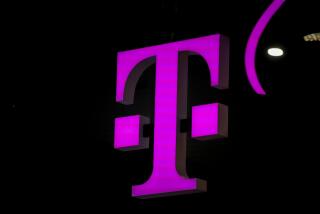Cingular to Sell Wireless Units
In a bid to boost growth in its T-Mobile USA unit, Europe’s largest phone company Tuesday agreed to pay $2.5 billion in cash for Cingular Wireless’ networks in the booming wireless markets of California and Nevada.
Deutsche Telekom’s purchase would unwind an agreement from 2001 granting both companies joint use of the networks, Rene Obermann, head of the T-Mobile International unit, said at a presentation in Bonn.
T-Mobile USA is the No. 5 wireless carrier in the United States.
“They need access to these areas because the U.S. is what’s driving growth,” said Friedrich Diel, who holds Deutsche Telekom shares among the $13 billion he helps manage at Frankfurt Trust Investment in Frankfurt, Germany. “The investment makes sense.”
Deutsche Telekom entered the U.S. market in 2001 with the $35-billion purchase of VoiceStream Wireless Corp., now called T-Mobile USA, and has made the unit its fastest-growing business.
The planned purchase is the biggest acquisition yet for Chief Executive Kai-Uwe Ricke, who took over in 2002.
Deutsche Telekom expects the number of customers for its T-Mobile USA business to be “well beyond” 16 million by the end of this year, Obermann said.
More than 20% of U.S. customer growth will come from California and Nevada, which account for 11% of T-Mobile USA’s total customer base, Obermann said.
Deutsche Telekom and Cingular, which is jointly owned by SBC Communications Inc. and BellSouth Corp., had an agreement allowing each company to use the networks of the other operator in states where they had no wireless infrastructure. Cingular used Deutsche Telekom’s network in New York.
Cingular in February agreed to buy AT&T; Wireless Services Inc., the No. 3 U.S. mobile-phone provider, for $41 billion to surpass Verizon Wireless as the nation’s biggest mobile-phone operator. Some analysts have said the government may force Cingular to sell spectrum in cities where SBC and BellSouth are the dominant local carriers.
The German telecommunications giant would make a cash payment of about $2.3 billion after subtracting $200 million for unwinding the joint venture, it said. The company would make the payments in early 2005 and forecast the transaction to close by then.
Deutsche Telekom also would pay $180 million for so-called wireless spectrum to get more capacity in cities including San Francisco, Sacramento and Las Vegas. The company has the option to buy additional wireless spectrum in Los Angeles and San Diego over the next two years and may decide to buy more spectrum in cities such as Miami, Boston and Cleveland, Obermann said.
The company didn’t disclose how much it may pay for the optional spectrum purchases.
More to Read
Inside the business of entertainment
The Wide Shot brings you news, analysis and insights on everything from streaming wars to production — and what it all means for the future.
You may occasionally receive promotional content from the Los Angeles Times.










